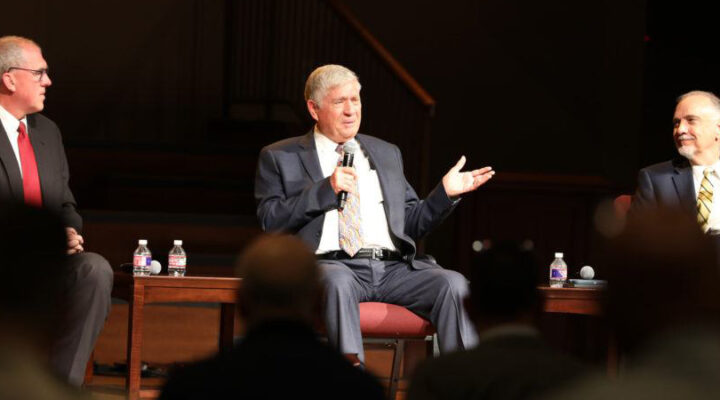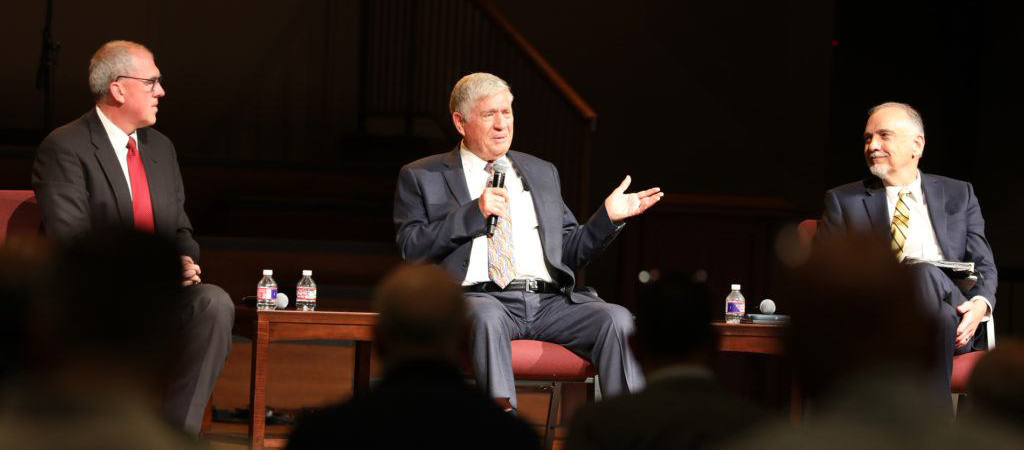While sharing in affirmation of the “conservative resurgence” of the late 20th century, three men vying to become president of the Southern Baptist Convention expressed different current priorities during a first-of-its-kind candidate forum May 4.
The event at First Baptist Church of Keller, Texas, brought together Bart Barber, pastor of First Baptist Church of Farmersville, Texas; Robin Hadaway, a former international missionary and current seminary professor; and Tom Ascol, pastor of Grace Baptist Church in Cape Coral, Fla., and leader of a group of Southern Baptist Calvinists called Founders Ministries. The three will be nominated for the presidency during the SBC annual meeting in Anaheim, Calif., June 14.
Barber described an SBC that is largely sound and is run with good trust by the hundreds of elected trustees and agency leaders. Ascol described an SBC he believes is sliding toward liberalism and needs reform from the inside out. Hadaway described an SBC that needs to re-emphasize its first love of missions.
Opening statements
In opening comments, Barber compared the SBC’s official constitution to the Constitution of the United States and declared himself to be a strict constructionist on both.
A strict construction of the U.S. Constitution is “leading us to do wonderful things like strike down Roe v. Wade,” he said.
Likewise, the SBC’s constitution gives the president three main duties, he added. “It’s the president’s responsibility to protect the rights of the messenger body, to answer the questions of the messenger body and to execute the decisions of [the] messenger body.”
“Beyond that, moderating the meeting fairly, [being] prepared to appoint committees that are true to our common beliefs and the Baptist Faith and Message and supportive of the Cooperative Program, and that help all of who we are as a family of Southern Baptist to be United in the mission of sharing the gospel all around the world.”
Hadaway said his vision for the SBC is to “remember the mission we Southern Baptists began just trying to support a couple of missionary couples overseas. And that’s what draws together others once a year to pass the budgets for the (North American Mission Board) and the International Mission Board. All these other things we do, including where I work at the seminary, are extra added, but what’s important is supporting our missionaries.”
“All these other things we do, including where I work at the seminary, are extra added, but what’s important is supporting our missionaries.”
Ascol said while he’s “delighted to be a part of this Southern Baptist Convention … I’m concerned about this Southern Baptist Convention. I think we need to change the direction in the way that we’re going. Not because we’ve got rank liberals among us. I don’t believe that’s true, but I believe that the wind of an acidic cultural mindset has begun to creep in to some of our institutions and agencies.”
The agencies and institutions of the convention “need to be responsive to the churches,” yet that’s not always happening, Ascol charged. “They’re accountable to us. And I’ve raised questions with entity heads, with trustees for years about concerns. And I just haven’t been satisfied with the answers that have been given.”
Ascol’s concerns
Later during the forum, Ascol outlined more of his specific concerns and aired his grievances that one of the pastors supporting his candidacy has been treated wrongly by denominational leaders. That pastor, Tom Buck, and his wife, Jennifer, have not been treated with “equal weights and measures” by some denominational leaders and by the SBC’s Sexual Abuse Task Force, he charged.
Ascol identified “two broad areas that I would want to focus on and use the bully pulpit of the presidency to speak to these things.”
“One is we are in desperate need primarily of spiritual reformation. I mean, quite honestly, brothers and sisters, I think we have lost the fear of God in our churches, in our convention.”
“Quite honestly, brothers and sisters, I think we have lost the fear of God in our churches, in our convention.”
Here he returned to his concern for Tom and Jennifer Buck, whom he said have been victimized by “those that have positioned themselves as the champions for sex abuse victims” but who “have lied and covered up their complicity in further abusing Jennifer.
“If you fear God, you don’t do that,” he added. “So I would want to see us fear the Lord. Over 150 times, the Bible uses that phrase, a “fear of the Lord,” a “fear of God.” And then there are many more times where the concept is set before. I think we’ve got to come to terms with the fact that we have drifted into some spiritual apathy and complacency that can only be healed by God.”
Next, Ascol said, “we’ve lost our concept of the law of God. We are gospel people. … Nobody gets saved by keeping the law. You can’t, the law condemns. God’s gospel is what saves. … When we trust Jesus Christ as Lord, knowing that we’re condemned by the law of God, we say, ‘Jesus, what do you want us to do?’ And he says, ‘Well, if you love me, keep my commandments.’ And so we need to be a people that come back to understanding the law, if we would do that and emphasize it.”
If more Christians would “come back” to the law of God, “then we would not be so confused or easily manipulated on concepts like love and justice, which we are a lot today,” he said. “People are saying, ‘Well, if you love, this is what love does. If you love, you’ve got to get inoculated or wear a mask or do these things because that’s what love does. And they’re not thinking biblically about love and justice.”
His second priority, he said, is that the SBC needs “structural renovation.”
“We need to train our trustees to understand that they are not unpaid political relations departments for the entities that they serve.”
“The No. 1 thing in my mind about that … is a trustee system. We need to train our trustees to understand that they are not unpaid political relations departments for the entities that they serve. They hold the entities in trust for the churches, and they need to be given the tools and the understanding of how to do that.”
Barber calls for spiritual awakening
In his closing comments, Barber emphasized the need for “spiritual awakening and revival and reformation in our churches.”
“No revival ever came through telling everybody else about their sins,” he said. “Revival comes when people look at their own sins and seek to repent of those. And … we live in a culture that says, ‘Don’t apologize. It’s a sign of weakness.’ We live in the culture in which people get on the internet. People get on cable news shows or whatever else. And with red angry faces, they tell about what’s wrong with the other guy. They all shout about and make accusations about what all those other people are doing. And if we’re going to be concerned about culture creeping into the SBC, we need to be concerned about the other things that we’ve talked about here, but we need to be concerned about that culture creeping into the SBC, because it will destroy our cooperation. It’ll blow the whole thing apart if we’re not careful.”
“No revival ever came through telling everybody else about their sins.”
Barber added: “We need to listen to people more. We need to shout at each other less. We need to do that in a context of being firmly committed to our doctrinal parameters and the Baptist Faith and Message 2000 and holding on to our Baptist distinctives and to the inerrancy and sufficiency of Scripture. Those things are sufficient to lead us forward, to do great work through the Cooperative Program, but alongside transparency and accountability, we’re going to have to have civility. If we don’t have civility, transparency and accountability aren’t going to help us very much.”
Backgrounds described
If any one of these three candidates are elected — there is rumor of a megachurch pastor entering the race still — he would be the first SBC president in decades who was not a megachurch pastor.
In good Baptist fashion, the candidates described their upbringings, their salvation experiences and their calls to ministry.
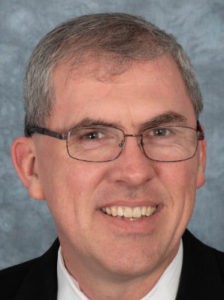
Bart Barber
Barber told of being baptized in a hand-made baptistry in a small church and experiencing a call to ministry while attending an associational children’s camp.
Hadaway told of being raised in a home of Christian Science, which he called a “cult,” until when he was 12 years old his younger sibling was born with Down Syndrome, which led his parents to seek counsel from a Southern Baptist layperson who led them to faith in Jesus Christ.
Ascol told of growing up the youngest of six children born to “a very godly mother and a very troubled father.” That all six children came to Christian faith demonstrates “the power of a godly mother,” he said. “You look at our family, if you would put it down on paper and you’d say, ‘This family is so dysfunctional, you cannot anticipate anything good coming from this.’ And yet my mother prayed and, and my earliest recollection of anything spiritual was seeing her on her knees in my living room as a little boy. And she was pleading with God, begging God.”
SBC boundaries
All three candidates expressed strongly conservative views on key social and theological issues and the needed boundaries of what churches should be included within the SBC.
All three candidates expressed strongly conservative views on key social and theological issues and the needed boundaries of what churches should be included within the SBC.
“We need to figure out ways that we can exercise our autonomy as a convention of churches in helping local churches to decide whether or not they want to be a part of the autonomous Southern Baptist Convention,” Ascol said. “And if they’re going to ordain women, if they’re going to affirm homosexual Christianity or any of the other things that the culture is now holding up in front of us that this is what love looks like, this is what justice demands, then we need to be able to say to them, ‘You know what? You’re not wanting to be a part of us, because that’s not who we are.”
In another section of the forum, the candidates talked about finding unity in diversity within the 47,000 SBC churches nationwide.
“We have championed we can do more together than we do separately,” Barber responded. “And I think in the face of hostile times that are coming for people who believe the Bible and serve Christ, this is a time for us to be building coalitions, not dividing coalitions, because they’re coming after all of us eventually, and we’re going to need each other.”
Hadaway said diversity should be built within “a wide tent, but it can’t be so wide that it collapses, but it also can’t be so narrow that only you and I can get in it.”
“When it comes to diversity, we have the Baptist Faith and Message and … the churches that come have to agree with that. Now we can’t police what goes on in every individual Southern Baptist church … because there’s just too many.”
Ascol noted that “the churches of the SBC agree to cooperate on certain things, not everything. And so my church, isn’t going to do everything the same way that Bart’s church is going do it. And that’s OK. He’s in Texas, I’m in Florida. We should acknowledge that. But we do need to come to terms with some of the problems that we are facing now are because of philosophies that have come in from the world, which the Apostle Paul warns us against in Colossians … and look at how those philosophies have begun to erode the foundation of our cooperative unity.”
For example, Ascol said, “Now we have churches that say it’s their ministry philosophy to ordain women, it’s their ministry philosophy to affirm organizations that say that they’re caring for homosexual Christians. And that that’s a good way to live. Well, that’s not right. I don’t think our tent is that big. If it’s that big, then we’ve got problems and we need to look at the stakes and go back and say, ‘No, here are our boundaries.’”
Critical Race Theory
Candidates also were asked their views on Critical Race Theory, a current flashpoint in conservative political and theological debate.
Barber said in his experience people have trouble defining Critical Race Theory and are confused about what it means.
Barber said in his experience people have trouble defining Critical Race Theory and are confused about what it means.
“I’ve had people tell me anything you do to try to include Black churches or Hispanic churches or Asian churches in the Southern Baptist Convention is racist,” he reported. “And it’s Critical Race Theory.”
Barber quoted such people saying: “You can do all you want to include small churches or large churches. You can do all you want to try to include rural churches or urban churches. You can do all you want to include all these other groups, but if you try to include Black churches or Hispanic churches or Asian American churches, … that’s racist, that’s Critical Race Theory. You can’t do that.”
For his part, Barber said, “I don’t buy that. I don’t think we have to espouse secular ideologies just to be kind and welcoming to churches that are on the fringe in Southern Baptist Convention. I think we ought to work to try to build our fellowship stronger and stronger and to invite more and more people to come and to be a part of this great family of churches. And I think that’s the president’s role in helping to show the difference between Critical Race Theory and just not being a jerk or just not caring about people who are on the fringe, but trying to bring people in.”
Ascol said Critical Race Theory “is an offshoot of Neo-Marxism, postmodernism and a theory that came out of critical legal theory. And it basically says that all racial relationships should be viewed in terms of power dynamics and that some are inevitably oppressed and others are inevitably the oppressors.”
Resolution 9
Critical Race Theory “takes the idea of sinful partiality from the Bible and redefines it in ways that are completely unbiblical,” he added. “And that’s one of my great concerns about this, is this wouldn’t even be a conversation among us had the Resolutions Committee in 2019 not rewritten a resolution that was submitted to renounce Critical Race Theory and intersectionality.”
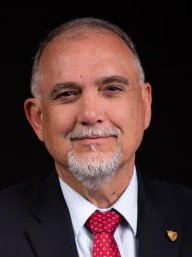
Tom Ascol
His reference was to Resolution 9 adopted by messengers to the SBC annual meeting that year, a resolution put forward by the Resolutions Committee in an attempt to keep the peace between Black pastors who were threatening to leave the convention if white pastors concerned about Critical Race Theory prevailed.
Ascol was part of a group that derided what they considered a watering down of their preferred resolution on Critical Race Theory that had been submitted to the committee. That campaign continued for two years, culminating in a failed effort to repeal Resolution 9 in 2021.
The 2019 Resolutions Committee “rewrote it to affirm Critical Race Theory and intersectionality. And then we were told, no, they’re just good analytical tools. And that was a disaster for the SBC. And it was tragic that it happened.”
Critical Race Theory has infected the larger culture and seeped into SBC institutions, Ascol charged.
He alleged that “one of our professors gave an interview to the New York Times and says that he teaches James Cone, who is the father of liberation theology … . He says, ‘But I just don’t use his name when I do it.’ We have another professor at a different seminary who wrote an article talking about how he was an oppressed man, because he is Black at our seminaries. He got a Ph.D. from Southern Seminary, teaches at Southern Seminary, one of the most prestigious seminaries in the world. We’ve got another professor who has, um, endorsed the Revoice conference, which says we affirm gay Christianity, we want to help homosexual Christians to flourish as brothers.
“We have boundaries, and the Baptist Faith and Message certainly points out our doctoral boundaries.”
“These things shouldn’t be. We have boundaries, and the Baptist Faith and Message certainly points out our doctoral boundaries. But I do believe just like we saw in the conservative resurgence, there are a lot of people who are saying, ‘Oh, we believe the Bible, we believe the Bible,’ but they’re not thinking as rigorously as they need to be thinking about exactly what does the Bible say. … I’m grieved of what I see happening. It’s not a matter of partisanship with me. It’s a matter of deep conviction that we must change the direction of our convention right now.”
Asked by a forum moderator if those talked about had issued clarifications about their positions in response to his concerns, Ascol said: “The clarifications have not clarified.”
Critical Race Theory compared to evolution
For his part, Hadaway compared the current debate over Critical Race Theory to the debate over teaching evolution a century ago, resulting in the Scopes Trial.
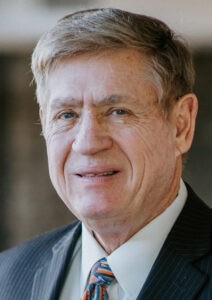
Robin Hadaway
“A hundred years ago, almost to this year, we were arguing about another theory that’s not biblical, and that’s the theory of evolution. … I believe in a six-day creation, but the secular universities and our public schools all accept the theory of evolution.
And just like the liberation theology he encountered as a missionary in South America, Hadaway said, “Critical Race theory … is the cultural problem of the day. But we have to be careful that we [aren’t seen as] sympathetic to the problem of racism in the United States and everywhere in the world.”
Role of SBC Credentials Committee
The most arcane conversation of the day came in response to a question about the proper role of the SBC’s Credentials Committee, the group that authorizes the seating of messengers at annual meetings.
Amid a detailed discussion of the inner workings of this committee, the three agreed that its role is vital.
Ascol, however, used the question to air another grievance of how he and his friends have been ignored by denominational leaders in the past.
“I’ve submitted several churches to the Credentials Committee. I’ve never heard from them.”
“I’ve submitted several churches to the Credentials Committee. I’ve never heard from them. And I don’t know if they investigated them or what they did or what the disposition is. That’s one thing that needs to change, because if there’s something that is risen to the level of actually making a report and asking for an investigation, I think the church that makes that request deserves the courtesy of a reply to let them know the disposition of that request.”
As a specific example, Ascol said he had lodged a complaint with the Credentials Committee against Saddleback Church, the largest church in the SBC, when it ordained three women as pastors.
“They were ordaining women for the first time. They celebrated it. I sent a note to the Credentials Committee and said, “I think this is out of step with the Baptist Faith and Message. I believe this needs to be investigated. Now, I don’t know if they investigated or not. And that was like the third or fourth time that has happened. I also submitted a concern about a church in Florida that was using Game of Thrones and Victoria’s Secret in their worship. You know, I mean, that was, it is pagan worship.”
The work of the SBC’s Credentials Committee would be easier if local Baptist associations paid closer attention to their errant congregations, Barber suggested. “The backbone of the local association needs to be restored so that we’re not trying to do this at the SBC level.”
Later, Ascol applied similar logic to a question about the SBC’s Sexual Abuse Task Force: “If our churches were doing what our churches are supposed to be doing, we wouldn’t have needed this investigation because churches would be holding church members accountable.”
Trust or lack of trust?
One of the greatest areas of disagreement between the three came through in expressions of trust or lack of trust in the current governance,
Ascol said he would call for “a forensic audit of all of our entities and agencies. Trust is the connective tissue of the Southern Baptist Convention. And our trust is fractured right now. … The trustees are supposed to do this. I think our trustee system’s broken, and it needs to be revamped.”
“By all the metrics that you can look at, Southern Baptist seem to have actually quite a great deal of trust in our entities and our institutions and the Cooperative Program.”
By “forensic audit,” Ascol said, he means “an audit that is designed to look at the laws, the state laws, local laws, federal laws, making sure those practices financially have been in accordance with the laws, if there’s any discrepancies in what’s reported or what’s on the books and what is discovered, those discrepancies are investigated. And so a forensic audit could discover that crimes have been committed. And if so, they can be rectified. That doesn’t mean that somebody has to go to jail. Maybe there just needs to be some money paid back or something, but it is an audit that is done with very serious potential consequences if there’s been something shady going on.”
Hadaway said he’s learned there’s “not really a such thing as a forensic audit,” and that all SBC entities are undergoing normal annual audits already.
Barber replied that while he agrees agency trustees “need to be trained better than they are,” he does not agree with Ascol’s call for a forensic audit.
“The fact of the matter is, by all the metrics that you can look at, Southern Baptists seem to have actually quite a great deal of trust in our entities and our institutions and the Cooperative Program. That doesn’t mean everything’s perfect. I know that it’s not, I’ve been a trustee. I’ve seen the things that gave me concern along the way. But I do think that we can find a way to have an appropriate level of transparency primarily through our trustees.”
Related articles:
A surprising nominee for SBC presidency announced in a surprising way
SBC presidency is a three-way race again with Barber announcement
Southern Baptists are still obsessed with Critical Race Theory

